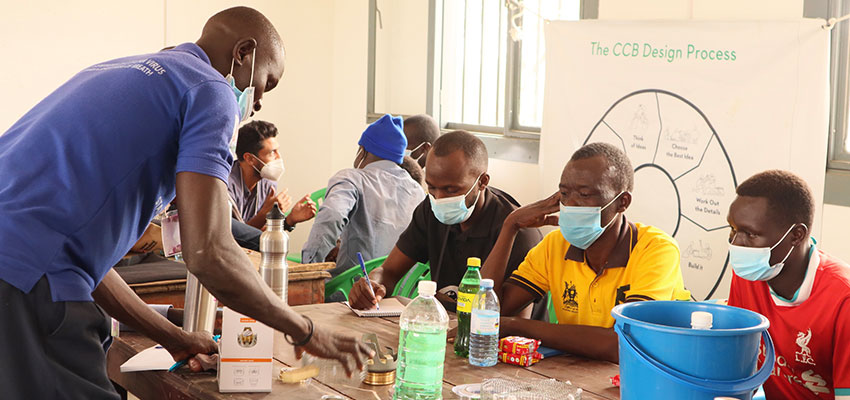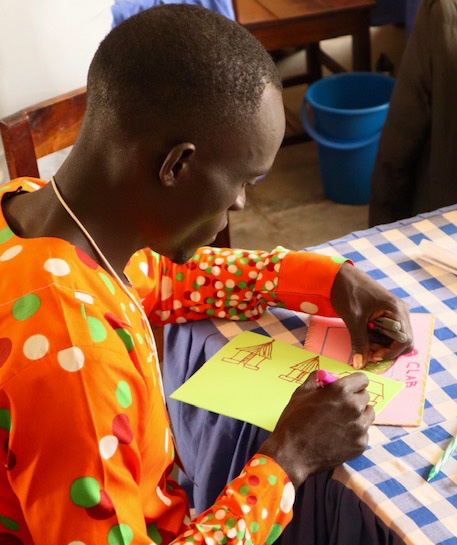
While attending MIT D-Lab’s Co-Creation Summit in Uganda, I had the chance to meet two entrepreneurs: Peter Kennedy and Samuel Lemen. Both are refugees from South Sudan residing in Rhino Camp and are graduates of Creative Capacity Building (CCB) trainings, a D-Lab program that teaches design thinking to those at the grassroots to strengthen their capacity to address everyday challenges.
Let me first introduce Peter. Peter is a 32-year-old father of three who owns a carpentry and blacksmith business. He came to Uganda in 2016 as a student to escape the famine in South Sudan. In 2021, he learned about CCB from Kulika Uganda, a non-profit organization that implements community development projects in social innovation and sustainable livelihoods. In November of that year, he began a two-month CCB training through which he learned how to design, gather information, and operate a business. He applied his new skills to solve a problem he faced in his work as a farmer: worn-out tools made his work inefficient, so he designed a machine to sharpen metal tools.
Though his innovation was meant to respond to a challenge in his own life, he recognized the value it had for others. After completing CCB, he also completed an entrepreneurship training and established a retail shop from where he can serve his community using his machine. He told me he is proud to be the only one in his area that provides tool sharpening services, attracting customers from five zones in Rhino camp. While having lunch with him, his phone kept buzzing with customers trying to reach him.
Today, he stopped working as a farmer to fully focus on his business, which is his main income source. He collects 1,000 Ugandan shillings for every tool he improves and is saving with the hope of sending his children to school. His current goals are to secure startup capital through a village savings and loan association to build more sharpening machines, establish more kiosks to more easily reach his growing customer base, and grow his business. He also hopes to teach design thinking to others in his community so that more people can become entrepreneurs like him.
Let me now introduce Sam. Arriving in Rhino camp in 2016, he attended a one-month CCB training in March 2021. He then graduated to an energy training also developed by MIT D-Lab, which applied the CCB methodology to address the lack of electricity in refugee settlements. Sam was part of a team that built a charging box using timber, batteries, and solar power. The innovation received such positive community feedback during the testing phase that his team decided to make a business out of their creation. They opened a charging shop in Ofua zone with two of their charging boxes and marketed their business by offering free charging services on their opening day. Word about their innovation spread, and today Sam and his team operate a business that brings in 32,000 to 33,000 Ugandan shillings in revenue per month.

Their shop is now equipped with four charging boxes and serves people from different zones in Rhino camp. Similar to Peter, Sam is eager to get a loan to build a bigger business with multiple shops across different settlements, offering additional services such as printing and photocopying. He would also like to improve the initial design of the charging box to create a more efficient product.
Both Peter and Sam face challenges in their efforts to expand their business activities. Peter explained that his two main obstacles are access to capital and the long distance between his village and Arua, where he gets building materials. Sam described the technical challenges he has: due to the weak battery used in his charging boxes, it takes a day to charge one phone, creating a backlog in his operations. He is thus unable to serve all the customers that come to his store and is limited in his ability to increase his income. Despite these obstacles, both Peter and Sam are hopeful about attaining their visions of success. They view design as a continuous process and are eager to improve their innovations over time while continuing to learn about building a business.
These conversations revealed three key points. First, CCB is a critical tool for empowerment. Not only did the trainings provide an opportunity for Peter and Sam to create an income-generating asset, but also, they fostered a positive mindset in which both feel more confident in their abilities to take ownership of the future. Second, while piloting innovations has its challenges, scaling up has its own set of difficulties. CCB helps with building a product that participants could bring to market; however, participants often struggle with accessing the financing and resources that would allow them to grow further as entrepreneurs. Private sector actors and financial institutions could help here. Third, innovation begets more innovation. Having completed CCB, Peter and Sam are exploring more opportunities to expand their learning on the design process, increase their skills as engineers, and strengthen their business acumen. Withe their experience and learnings from the Co-Creation summit, I hope Peter and Sam will be able to brainstorm ways to scale the impact of their innovations, moving towards further success.
Related blog post by Miu Kumakura: Creative Capacity Building in Uganda: Scaling the Impact of Refugee-Led Design Solutions
About the author
Miu Kumakura is a former student of MIT D-Lab's EC.750 Humanitarian Innovation class. She has been living in Uganda for a six-month fellowship that explores the humanitarian-development nexus through a focus on sustainable building designs that innovatively respond to infrastructure needs. She graduated from Harvard University in 2021 with a BA in Government.
More information
MIT D-Lab Humanitarian Innovation (Program)
D-Lab: Humanitarian Innovation (MIT class)

